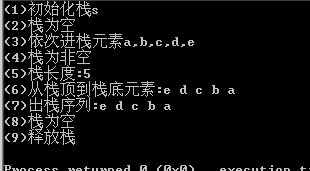第五周项目一 建立顺序栈算法库
2017-10-11 11:00
363 查看
main,.cpp
/*
文件名称:顺序栈算法库
作 者:胡德杰
完成日期:2017年10月10号
版 本 号:v1.1.11
*/
#include <stdio.h>
#include "sqstack.h"
int main( )
{
ElemType e;
SqStack *s;
printf("(1)初始化栈s\n");
InitStack(s);
printf("(2)栈为%s\n",(StackEmpty(s)?"空":"非空"));
printf("(3)依次进栈元素a,b,c,d,e\n");
Push(s,'a');
Push(s,'b');
Push(s,'c');
Push(s,'d');
Push(s,'e');
printf("(4)栈为%s\n",(StackEmpty(s)?"空":"非空"));
printf("(5)栈长度:%d\n",StackLength(s));
printf("(6)从栈顶到栈底元素:");DispStack(s);
printf("(7)出栈序列:");
while (!StackEmpty(s))
{
Pop(s,e);
printf("%c ",e);
}
printf("\n");
printf("(8)栈为%s\n",(StackEmpty(s)?"空":"非空"));
printf("(9)释放栈\n");
DestroyStack(s);
return 0;
}
sqstack.cpp
#include"sqstack.h"
void InitStack(SqStack *&s) //初始化栈
{
s=(SqStack *)malloc(sizeof(SqStack));
s->top=-1;
}
void DestroyStack( SqStack *&s) //销毁栈
{
free(s);
}
bool StackEmpty(SqStack *&s) //判断栈是否为空
{
return (s->top==-1);
}
int StackLength(SqStack *&s) //返回栈中元素个数
{
return (s->top+1);
}
bool Push(SqStack *&s,ElemType e) //入栈
{
if(s->top==MaxSize-1)
return false;
s->top++;
s->data[s->top]=e;
return true;
}
bool Pop(SqStack *&s,ElemType &e) //出栈
{
if(s->top==-1)
return false;
e=s->data[s->top];
s->top--;
return true;
}
bool GetTop(SqStack *&s,ElemType &e) //取出栈顶元素
{
if (s->top==-1) //栈为空的情况,即栈下溢出
return false;
e=s->data[s->top];
return true;
}
void DispStack(SqStack *&s) //输出栈
{
int i;
for (i=s->top;i>=0;i--)
printf("%c ",s->data[i]);
printf("\n");
}
sqstack.cpp
#include"stdio.h"
#include"malloc.h"
#define MaxSize 100
typedef int ElemType;
typedef struct
{
ElemType data[MaxSize];
int top;
}SqStack;
void InitStack(SqStack *&s); //初始化栈
void DestroyStack( SqStack *&s); //销毁栈
bool StackEmpty(SqStack *&s); //判断栈是否为空
int StackLength(SqStack *&s); //返回栈中元素个数
bool Push(SqStack *&s,ElemType e); //入栈
bool Pop(SqStack *&s,ElemType &e); //出栈
bool GetTop(SqStack *&s,ElemType &e); //取出栈顶元素
void DispStack(SqStack *&s); //输出栈

知识点总结:顺序栈代码的书写以及算法库的建立。
学习心得:栈的算法库的建立是个很繁琐的过程,但程序书写结束同样给我带来欣喜感。
/*
文件名称:顺序栈算法库
作 者:胡德杰
完成日期:2017年10月10号
版 本 号:v1.1.11
*/
#include <stdio.h>
#include "sqstack.h"
int main( )
{
ElemType e;
SqStack *s;
printf("(1)初始化栈s\n");
InitStack(s);
printf("(2)栈为%s\n",(StackEmpty(s)?"空":"非空"));
printf("(3)依次进栈元素a,b,c,d,e\n");
Push(s,'a');
Push(s,'b');
Push(s,'c');
Push(s,'d');
Push(s,'e');
printf("(4)栈为%s\n",(StackEmpty(s)?"空":"非空"));
printf("(5)栈长度:%d\n",StackLength(s));
printf("(6)从栈顶到栈底元素:");DispStack(s);
printf("(7)出栈序列:");
while (!StackEmpty(s))
{
Pop(s,e);
printf("%c ",e);
}
printf("\n");
printf("(8)栈为%s\n",(StackEmpty(s)?"空":"非空"));
printf("(9)释放栈\n");
DestroyStack(s);
return 0;
}
sqstack.cpp
#include"sqstack.h"
void InitStack(SqStack *&s) //初始化栈
{
s=(SqStack *)malloc(sizeof(SqStack));
s->top=-1;
}
void DestroyStack( SqStack *&s) //销毁栈
{
free(s);
}
bool StackEmpty(SqStack *&s) //判断栈是否为空
{
return (s->top==-1);
}
int StackLength(SqStack *&s) //返回栈中元素个数
{
return (s->top+1);
}
bool Push(SqStack *&s,ElemType e) //入栈
{
if(s->top==MaxSize-1)
return false;
s->top++;
s->data[s->top]=e;
return true;
}
bool Pop(SqStack *&s,ElemType &e) //出栈
{
if(s->top==-1)
return false;
e=s->data[s->top];
s->top--;
return true;
}
bool GetTop(SqStack *&s,ElemType &e) //取出栈顶元素
{
if (s->top==-1) //栈为空的情况,即栈下溢出
return false;
e=s->data[s->top];
return true;
}
void DispStack(SqStack *&s) //输出栈
{
int i;
for (i=s->top;i>=0;i--)
printf("%c ",s->data[i]);
printf("\n");
}
sqstack.cpp
#include"stdio.h"
#include"malloc.h"
#define MaxSize 100
typedef int ElemType;
typedef struct
{
ElemType data[MaxSize];
int top;
}SqStack;
void InitStack(SqStack *&s); //初始化栈
void DestroyStack( SqStack *&s); //销毁栈
bool StackEmpty(SqStack *&s); //判断栈是否为空
int StackLength(SqStack *&s); //返回栈中元素个数
bool Push(SqStack *&s,ElemType e); //入栈
bool Pop(SqStack *&s,ElemType &e); //出栈
bool GetTop(SqStack *&s,ElemType &e); //取出栈顶元素
void DispStack(SqStack *&s); //输出栈

知识点总结:顺序栈代码的书写以及算法库的建立。
学习心得:栈的算法库的建立是个很繁琐的过程,但程序书写结束同样给我带来欣喜感。
相关文章推荐
- 第五周 项目1 - 建立顺序栈算法库
- 数据结构上机实践第五周项目1- 建立顺序栈算法库
- 第五周项目1--建立顺序栈算法库
- 数据结构第五周项目1--建立顺序栈算法库
- 第五周-项目一 建立顺序栈算法库
- 第五周项目1--建立顺序栈算法库
- 第五周项目1-建立顺序栈算法库
- 第五周项目1——建立顺序栈算法库
- 第五周项目1—建立顺序栈算法库
- 第五周项目1 - 建立顺序栈算法库
- 第五周 项目1-建立顺序栈算法库
- 第五周项目一 建立顺序栈算法库
- 第五周项目1-建立顺序栈算法库
- 数据结构上机实践第五周项目1- 建立顺序栈算法库
- 第五周 项目1 建立顺序栈算法库
- 第五周 项目一 建立顺序栈算法库
- 第五周项目1——建立顺序栈算法库
- 【第五周】项目1-建立顺序栈算法库
- 第五周 项目一【建立顺序栈算法库】
- 第五周 项目一——建立顺序栈算法库
